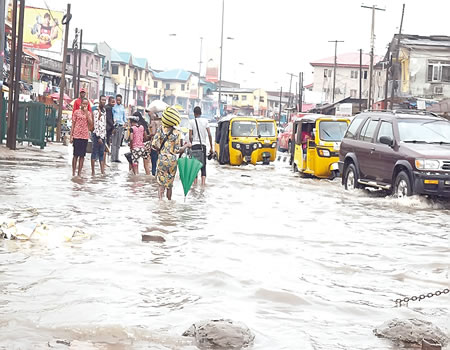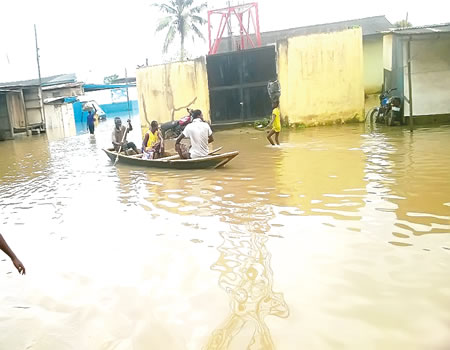It is a city synonymous with flooding. Successive governments have gone to great lengths for solutions. No measure has worked effectively. The coming of the rainy season is a nightmare for countless Lagosians. Will this season be different? ask AKIN ADEWAKUN, CHUKWUMA OKPARAOCHA, TOLA ADENUBI and SYLVESTER OKORUWA.
FLOODING is a major problem in Lagos, which is Nigeria’s foremost coastal city. The city’s flood problem is not limited to the lower-class zones. Places such as Ahmadu Bello Way and other parts of Victoria Island are also known to be plagued by this problem. Various parts of Ikoyi and Lekki, all of which are upper-class places in Lagos are also known to be having their fair share of the menace.
For the residents of Kukoyi Street in the Alapere area of Ketu, and Orisunbare Street in the Akowonjo area, both in Lagos State, living in the midst of flood is a part of life.
When Saturday Tribune visited the latter areas to make inquiries on how the residents were preparing for the rainy season, a fashion designer on Kukoyi Street, Mrs Folape Aroyewun, explained that almost everybody in the community, which is widely regarded as a “flood zone” was already bracing up for the rains.
“If you go to most homes on Kukoyi Street, almost all the residents who have rugs in their apartments have removed them. Many are already expecting the floods because this area is very close to the swamps. Some houses with low pavements have had them raised. But in spite of all these, most houses still get flooded. It is like a curse for us in this area, because no matter what people do to avoid the floods, they still come”, she Mrs Aroyewun noted.
For Betty Nwankwo, leaving Alapere is the only solution to the floods. “I have told my husband that we have to leave this area because incessant flooding has made life very difficult here. After every flooding, we face bad smell all around. Alapere is close to the swampy area leading to the lagoon. Therefore, whenever it rains heavily, the ensuing floods bring all sorts of debris into our houses. I have little children to take care of, and I always have to ensure their safety, especially whenever there is a downpour in the night. I hope that my husband gets enough money soon, because we are planning on leaving this area. It is not something we can cope with”, Nwankwo stated.
Similarly, at Orisunbare in the Akowonjo area of Egbeda, the residents explained that flood problem was largely limited to two roads in the community but they added that the houses are only affected during heavy downpours.
In the view of Lolade Orioye, a medical student at the Lagos State University Teaching Hospital, “anytime it rains, most of the streets become flooded. Our community has started ridding the drainage system of all sorts of items that could block it. The floods don’t come into our homes except on occasions, but clearing the drainage helps in restricting the floods to the streets.
“Sometimes, everybody forgets to do this, maybe, due to our schedules, and if this happens and there is a downpour, especially in the night, there will be a serious problem”, Orioye said. According to him, the problem is made worse because his community suffers from years of poor and neglected drainage system which, he said, easily gets blocked.
“In times past, where we had flooding problem was when everybody forgot to clear their drainages, and as a result, houses were heavily flooded with water. But to avoid experiencing this again, we now pay people to help us clear our drainages periodically before the rains come fully”, he added.
Perennial problem or climate change?
Other places that are known to be plagued by the flood problem include Ajiliti, Mile 12; Gbagada Expressway; Shogunle Bus Stop and various parts of Ikorodu, as well as the Alagbole area, after Berger, going to Akute and Awolowo Way of Ikeja are believed to be among the worst hit anytime it rains heavily.
In many of these places, it is not uncommon to see flood water reaching above knee level, covering roads, whereby road users are forced to roll up their pants up to above the knee when waddling through puddles on the roads.
While climate change has been fingered as one of the factors to blame for the growing cases of flood in Lagos, the problem has also been blamed on residents who are believed to have cultivated the habit of dumping refuse into canals, drainages and other waterways.
This development, during downpours, makes easy flow of water difficult, thereby making rain water find a new course for itself, including inside people’s houses.
Corporate culprits
According to a survey conducted by Saturday Tribune, many residents of places that are very close to canals still engage in the habit of dumping refuse into canals. Even manufacturing companies are not left out of this act.
In places like Agege, Ajegunle, Oworonshiki and Apapa, refuse was spotted in drainages, gutters, canals and other waterways, an indication that some residents have remained defiant to warnings to desist from dumping refuse into drainages.
For the past couple of years, Lagos, like many other states in the country, has been plagued by incessant flooding, especially after a downpour. This has led to loss of lives and destruction of property over the years.
Despite the government’s repeated efforts at combating the menace, flooding has continued to be recorded in various parts of the state, which has made some communities in the lowlands to be considered danger zones by the state government. Such communities are Ajegunle/Owode-Elede, in Agboyi Ketu; Ijora/Badia, Apapa/Igamu, Aradagun in Badagry, Jakande area in Eti-Osa, and Alimosho Local Government Area.
Meanwhile, residents of various parts of Lagos State have begun complementing the state government’s efforts in ensuring that drainages in the state are well prepared for the coming of the rains.
During Saturday Tribune’s visit to some communities in the state, residents were seen cleaning up blocked gutters with rakes, spades and shovels.
In places such as Ajegunle and Ketu, residents were seen cleaning their drainages, many of which had been stacked with items such as bags of packaged drinking water, generally known as “pure water,” plastic bottles and various other items.
“The government cannot possibly touch every vicinity in the state. It, therefore, behoves everyone to ensure that the drainage systems, especially those in front of their houses, are well cleaned and dredged. The memories of the floods of past years, which became aggravated as a result of poorly managed drainage system, are still fresh in our minds. We wouldn’t want a recurrence of past horrible incidents”, this was the view of Mr Richmond Esiri, a resident of the Apapa-Ajegunle area of the state, in a chat with Saturday Tribune.
The efforts of such residents could be said to be complementary to those of the state government, which has, in recent time, embarked on massive dredging and cleaning of drainages in the state, including channelisation of about 370 out of the total 623 primary and secondary schools, which have been identified to be prone to flood.
For the people of Olorunto community in Agbado Oke Odo Local Council Development Area of Lagos, this year’s rains must be handled with the seriousness they deserve. Although the community is immune to flooding each time it rains, that, still, would not make its inhabitants take chances, especially this rainy period.
In order to achieve this, home owners in the community have embarked on an enlightenment campaign, highlighting the imperatives of keeping a clean environment at this period by ensuring that the gutters are free.
The chairman of the Olorunto Landlords Association, Alhaji Rasheed Adetola, stated that the association’s executive members had already informed every landlord on the street to ensure that their environments were kept safe.
“We don’t really have any challenge with flood, but the issue is that some of the residents on the street still empty their refuse in the gutters each time it rains. This is a habit we are trying to discourage, because we know other people pay dearly for this. We are actually insisting that anybody caught dumping refuse in the gutter during this period should be reported to the executive committee and we will deal with such person appropriately.
“So, for now, what we are doing to ensure there are no incidents during the period is to clear our gutters and ensure that nobody dumps refuse in those gutters during the period”, he stated. While Mrs Akinyemi would not kick against the recent actions taken by the landlords in preparation for the rainy season, she appealed to the PSP operators to also fulfil their own side of the bargain, by ensuring that refuse are packed as and when due.
“The challenge we have here is that the PSP operators don’t come regularly during this period. Even sometimes when they come, there are some areas on the streets which they would never reach on the excuse that the roads are bad. And, whenever this happens, residents will be left with no choice but to wait for the rains to dispose of their refuse”, she stated in an interview with Saturday Tribune.
Unlike Olorunto community, residents of flood-prone Raji Razak Street, in Oke Odo seem unprepared, for now, for the coming rains. For example, a resident, who identified himself simply as Lawal, explained that nobody had actually briefed them on measures and strategy to adopt to survive the coming rains. “What we just do now is to wait for the coming rains and pray that they are not as destructive as those of the previous years”, he stated.
What we are doing –Govt
Speaking with Saturday Tribune, spokesperson of the Ministry of the Environment, Mr Mukaila Sanusi, said the ministry would soon issue a statement on measures that would be taken to prevent flooding in flood prone areas in the state.
Sanusi, who gave the assurance that the state government was always proactive, said the ministry was waiting for the annual report on weather forecasts for the whole country from the Nigeria Metrological Agency (NiMet) before issuing the statement.
According to him, the report from the agency, which would forecast weather situation for every state of the federation, including Abuja, would enable the Lagos State government know further steps to take to address the situation as it concerns the state.
Meanwhile, a member of the state House of Assembly, Honourable Bisi Yusuf, has urged residents of the state to vacate shanties to avoid untimely deaths when their shanties collapse during thunderstorms.
Speaking against the backdrop of the death of a woman in Ikola, Agbado Oke-Odo Local Council Development Area under Alimosho Constituency 1, which he represents, Yusuf warned the residents to always avoid anything that could lead to untimely death.
“How do you prevent that kind of rainfall (at Ikola)? Our people must be very careful and know where to live and how to live. Houses must not also be close to high tension cables. It is so pathetic that despite enlightenment by the government, people could build houses in such places. I was in the rain and I saw what happened. The wind even uprooted an underground tank being fixed in a petrol station”, he said.
It will be recalled that reports had it that a pregnant woman, who was in a church, died when the concrete blocks from the church’s fence collapsed on her during a rainstorm which wreaked havoc across Lagos on Monday. Witnesses said that the state ambulance services came to evacuate her corpse in the evening from the church, located on Power Line Road, Ikola-Ilumo, Lagos.
At Peace Estate, Command Road, Ipaja, the storm removed the roof of several houses, snapped and fell electricity poles, and also damaged a block industry.
“People should not live in shanties because of poverty. It is not the best to live in shanties. You should not buy land under high tension. Highly sophisticated houses that were approved were affected by the rainfall”, he added.






